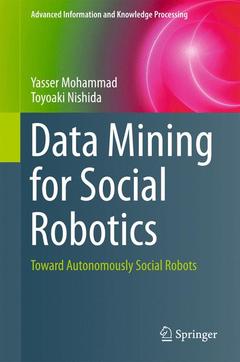Description
Data Mining for Social Robotics, Softcover reprint of the original 1st ed. 2015
Toward Autonomously Social Robots
Advanced Information and Knowledge Processing Series
Authors: Mohammad Yasser, Nishida Toyoaki
Language: English
Subject for Data Mining for Social Robotics:
Approximative price 147.69 €
In Print (Delivery period: 15 days).
Add to cartPublication date: 02-2016
Support: Print on demand
Approximative price 105.49 €
In Print (Delivery period: 15 days).
Add to cartPublication date: 03-2018
Support: Print on demand
Description
/li>Contents
/li>Comment
/li>
This book explores an approach to social robotics based solely on autonomous unsupervised techniques and positions it within a structured exposition of related research in psychology, neuroscience, HRI, and data mining. The authors present an autonomous and developmental approach that allows the robot to learn interactive behavior by imitating humans using algorithms from time-series analysis and machine learning.
The first part provides a comprehensive and structured introduction to time-series analysis, change point discovery, motif discovery and causality analysis focusing on possible applicability to HRI problems. Detailed explanations of all the algorithms involved are provided with open-source implementations in MATLAB enabling the reader to experiment with them. Imitation and simulation are the key technologies used to attain social behavior autonomously in the proposed approach. Part two gives the reader a wide overview of research in these areas in psychology, and ethology. Based on this background, the authors discuss approaches to endow robots with the ability to autonomously learn how to be social.
Data Mining for Social Robots will be essential reading for graduate students and practitioners interested in social and developmental robotics.
Preface.- Introduction.- Part I: Time Series Mining.- Mining Time-Series Data.- Change Point Discovery.- Motif Discovery.- Causality Analysis.- Part II: Autonomously Social Robots.- Introduction to Social Robotics.- Imitation and Social Robotics.- Theoretical Foundations.- The Embodied Interactive Control Architecture.- Interacting Naturally.- Interaction Learning through Imitation.- Fluid Imitation.- Learning through Demonstration.- Conclusion.- Index.
Reviews the key recent research in social robotics, learning from demonstration and imitation
Offers a detailed explanation of key algorithms in change discovery, motif discovery and causality analysis
Illustrates in detail the design methodology for developing social robots using a novel developmental architecture that employs only unsupervised learning techniques to achieve autonomous sociability
Includes case studies in applying time-series analysis and data mining techniques to several problems in Human-Robot Interaction with an open-source MATLAB toolbox implementing the key algorithms
Includes supplementary material: sn.pub/extras

